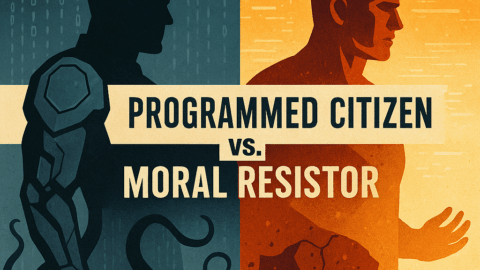We would suggest getting a background on oligarchy, tyranny, and consolidated power that, you read in our recent series concerning these issues:
- There Are Really Only Two Types of Government: Republic & Oligarchy
- There Are Two Types of Power: Concentrated & Separated
- Power Tends to Concentrate Into the Hands of A Few, An Oligarchy
- The Evils of Tyranny Are Rarely Seen By Those Who Lack Historical Knowledge
- The Results of Generational Psyops On A Society
“In 1776, we sought freedom from the tyranny of a political autocracy – from the 18th century loyalists who held special privileges from the crown.” — Franklin Roosevelt
In 1776, the American colonies sought freedom from the tyranny of British political autocracy and oligarchy, represented by the loyalists who held special privileges granted by the crown. The American Revolution was fundamentally a struggle against oppressive governance and the desire for self-determination.
Historical Context of 1776:
- Colonial Grievances:
- Taxation Without Representation: One of the primary grievances was the imposition of taxes and laws by the British Parliament, where the colonies had no representation. The famous slogan “No taxation without representation” encapsulated this frustration.
- Trade Restrictions: The British crown imposed various trade restrictions that hindered the economic prosperity of the colonies. Acts like the Navigation Acts limited trade to within the British Empire, benefiting British merchants at the expense of colonial interests.
- Quartering and Military Presence: The Quartering Act required colonists to house British soldiers, and the general presence of British troops in the colonies was seen as a tool of oppression and control.
- Loyalists and Special Privileges:
- Loyalists: Loyalists were American colonists who remained loyal to the British crown during the American Revolution. They often held special privileges and positions of power granted by the British government.
- Special Privileges: These privileges included land grants, positions in the colonial administration, monopolies, and favorable trade terms. Loyalists were perceived as benefiting from and perpetuating British control over the colonies.
The Quest for Freedom:
- Declaration of Independence:
- Philosophical Foundation: The Declaration of Independence, adopted on July 4, 1776, articulated the colonies’ desire for freedom. It drew on Enlightenment ideas of natural rights and social contract theory, asserting that governments derive their just powers from the consent of the governed.
- List of Grievances: The Declaration outlined a list of grievances against King George III, illustrating the tyranny and abuses that justified the colonies’ break from British rule.
- Revolutionary War:
- Struggle for Independence: The American Revolutionary War (1775-1783) was the military conflict that ensued as the colonies fought to secure their independence from British rule.
- Patriots vs. Loyalists: The war often pitted Patriots (those supporting independence) against Loyalists. This internal division added complexity to the struggle, as it was a conflict with Britain and a civil war within the colonies.
Implications for Governance:
- Establishing a New Government:
- Articles of Confederation: Initially, the newly independent states operated under the Articles of Confederation, which provided a loose confederation with a weak central government.
- U.S. Constitution: Recognizing the weaknesses of the Articles, the Founding Fathers drafted the U.S. Constitution in 1787, establishing a stronger federal government with a system of checks and balances to prevent tyranny.
- Bill of Rights:
- Protection of Individual Rights: The first ten amendments to the Constitution, known as the Bill of Rights, were adopted to protect individual liberties against potential government overreach. These rights include freedom of speech, religion, assembly, and the press, among others.
Legacy and Continuing Relevance:
- Enduring Principles:
- Liberty and Equality: The principles of liberty and equality, as articulated in the Declaration of Independence, continue to inspire movements for freedom and justice worldwide.
- Vigilance Against Tyranny: The historical experience of 1776 reminds us of the importance of vigilance against tyranny and the need to ensure that government remains accountable to the people.
- Challenges and Debates:
- Balancing Power: The ongoing challenge is balancing the need for effective governance with protecting individual rights and freedoms.
- Inclusion and Representation: Ensuring that all citizens are included in the democratic-republican process and that their rights are protected remains critical.
The quest for freedom in 1776 was driven by a desire to escape the tyranny of British political autocracy, oligarchy, and the special privileges granted to loyalists by the crown. This struggle led to the establishment of a new nation founded on principles of individual rights, self-governance, and vigilance against tyranny. These principles continue to guide and challenge us, reminding us of the importance of liberty, equality, and the need for accountable governance.
“If we’ve learned anything, it is that that government that is big enough to give you what want is more likely to simply take everything you’ve got. And that’s not freedom that’s servitude. That isn’t the way Americans were meant to live.” — Woodrow Wilson
Woodrow Wilson’s statement echoes a sentiment often associated with concerns about big government and its potential to overreach into individuals’ lives. This idea has roots in American political thought, emphasizing the importance of limited government and personal freedom. Here’s an exploration of this perspective:
Concerns About Big Government:
- Government Overreach:
- Loss of Autonomy: A government that becomes too powerful can encroach on individual autonomy, making decisions that should be left to individuals.
- Dependence on Government: When people become reliant on the government for their needs, they may sacrifice personal responsibility and independence.
- Economic Impact:
- Taxation and Redistribution: High levels of taxation to fund extensive government programs can stifle economic growth and innovation. Redistribution of wealth can also lead to resentment and a sense of unfairness.
- Regulatory Burden: Excessive regulations can create barriers to entrepreneurship and business, limiting economic opportunities and personal advancement.
- Political Power:
- Concentration of Power: A large, powerful government can lead to the concentration of power in the hands of a few, undermining democratic principles and checks and balances.
- Potential for Abuse: With more control, the potential for abuse of power increases, leading to corruption and the erosion of civil liberties.
The Ideal of Limited Government:
- Founding Principles:
- Constitutional Limits: The U.S. Constitution was designed to limit the powers of government, establishing a system of checks and balances to prevent any one branch from becoming too powerful.
- Bill of Rights: The first ten amendments to the Constitution explicitly protect individual liberties from government intrusion.
- Individual Freedom:
- Self-Reliance: The American ideal often emphasizes self-reliance and personal responsibility, encouraging individuals to shape their own destinies without excessive government interference.
- Economic Freedom: A free-market economy allows individuals to pursue their own financial interests, fostering innovation and prosperity through the highest morality above human passions and interests hitching to the creator.
- Civic Engagement:
- Active Citizenship: Limited government requires active participation by citizens to hold the government accountable and ensure it operates within its constitutional bounds.
- Community Solutions: Encouraging local and community-based solutions to problems can be more effective and responsive than top-down government programs.
Balancing Government and Freedom:
- Essential Services:
- Role of Government: While advocating for limited government, it’s also important to recognize the essential roles that government plays, such as providing public safety, infrastructure, and a social safety net.
- Efficiency and Accountability: The government should strive to be efficient and accountable, providing necessary services without overextending its reach.
- Public Debate and Policy:
- Informed Debate: Public debate about the role of government is crucial. Policies should be evaluated based on their effectiveness and impact on individual freedom.
- Policy Innovation: Experimenting with different governance and public policy approaches can help find the right balance between government involvement and personal freedom.
- Maintaining Vigilance:
- Protecting Rights: Constant vigilance is needed to protect individual rights and prevent government overreach. This involves active engagement in the political process and holding leaders accountable.
- Adaptability: As society evolves, the relationship between government and individuals may need to adapt, finding new ways to protect freedom while addressing collective challenges.
The idea that a government big enough to give you everything you want is also big enough to take everything you have highlights the importance of balancing government power and individual freedom. Advocating for limited government, personal responsibility, and economic freedom reflects foundational American principles. At the same time, it’s crucial to recognize the necessary roles of government and to engage in informed debate about the appropriate scope and function of government in society. Maintaining this balance is essential for preserving freedom and the nation’s well-being.








One Response
Excellent!